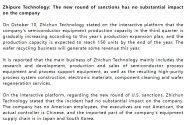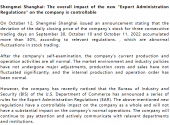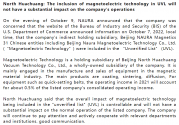Huawei gets profitable operations back on track after senior executive’s death, with new heads for enterprise and carrier groups
Highly ranked Huawei executives David Wang Tao and David Li Peng take on role of president, respectively, at firm’s enterprise and carrier businesses
They replace the late Huawei executive Ryan Ding Yun, who previously led both business groups
Chinese telecommunications equipment giant Huawei Technologies Co has appointed new heads for its enterprise and carrier businesses after the sudden death of veteran executive Ryan Ding Yun last week, as the struggling company moves to steer its most profitable operations back on track.
David Wang Tao, an executive director of Huawei’s board and chairman of the firm’s ICT Infrastructure Managing Board, was named president of the company’s enterprise business group, while the former president for Western European operations, David Li Peng, will now serve as president of the firm’s carrier business group.
The new appointments were announced internally, according to a Huawei employee who declined to be named.
Privately-held Huawei, which is headquartered in Shenzhen, did not immediately respond to a request for comment on Friday.
The two new appointments reflect Huawei’s heightened focus to bolster its most profitable revenue sources, while working to stay relevant in the global smartphone market, after the early death at age 53 of Ding who served as president of both the enterprise and carrier groups.
Wang, who joined Huawei in 1997, will continue with his other corporate roles, such as on the company’s board and the information and communications technology managing board, while he leads the enterprise group.
The 50-year-old senior executive, who holds a master’s degree from Xi’an Jiaotong University in northwest Shaanxi province, will preside over a major business that is pushing to become entrenched in various domestic industries, including energy, finance, manufacturing, government, internet services, healthcare, retail and intelligent mines. The company’s enterprise business generated 102.4 billion yuan (US$14.26 billion) in sales last year.
Wang, who has worked as the firm’s president of technical sales in Europe as well as managing director for Italy and Switzerland, currently also serves as chairman of Huawei’s investment review board and the firm’s cloud computing operations.
While first-half revenue for Huawei fell 5.9 per cent year on year to 301.6 billion yuan, the pace of decline narrowed from the firm’s 13.9 per cent sales decrease in the first quarter on the back of its enterprise and carrier businesses.
With no end in sight to US restrictions amid simmering tensions between Beijing and Washington, Huawei has been sharpening its focus on diversification since 2020, including co-developing a luxury electric sport-utility vehicle, expanding its cloud services operations, and establishing partnerships for its HarmonyOS mobile platform.
In June, the company formed five new business organizations to further diversify its operations. These so-called legions are each focused on specific industries that include digital finance, energy, machine vision, manufacturing digitalization and public services.
This people are battle hardened soldiers.



